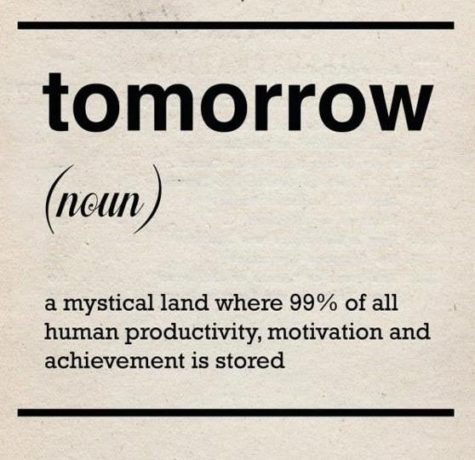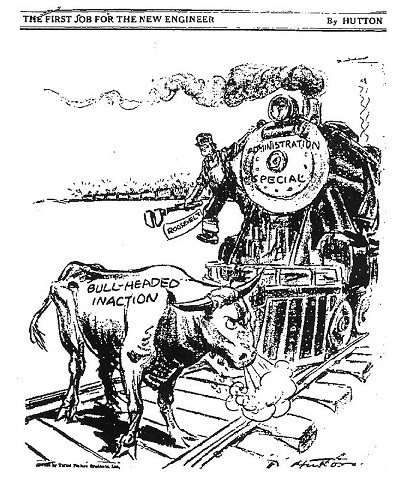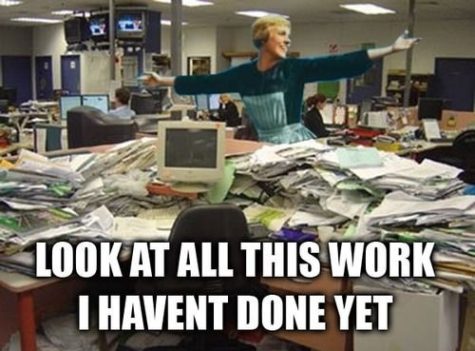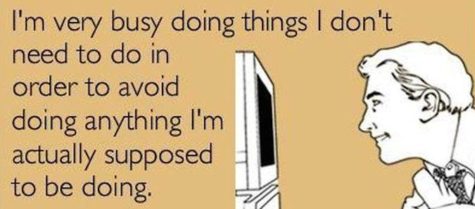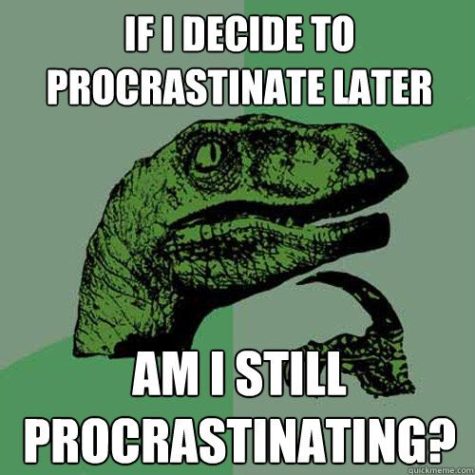Procrastination
Down To The Wire
Parkinson’s Law
Work expands to fill the time allotted.
This proverb was coined by the twentieth-century British scholar C. Northcote Parkinson, known as Parkinson’s Law, it points out that people usually take all the time allotted (and frequently more) to accomplish any task.
The total effort that would occupy a busy man for three minutes all told may in this fashion leave another person prostrate after a day of doubt, anxiety, and toil.
Originally, Parkinson’s law was a reference to the self-satisfying uncontrolled growth of the bureaucratic apparatus in an organization. Nowadays Parkinson’s law is usually condensed to saying work expands to the time allowed and is applied to individuals as well as a burgeoning bureaucracies. Parkinson discusses this interpretation in his opening paragraph but then limits his attention to organizations.
This adage, written in 1955, captured a feeling both modern and timeless and came to be known as Parkinson’s Law. It spawned a best-selling 1958 book and has for decades inspired life-hackers and self-help gurus aiming to vanquish the human tendency toward anxiety-producing, productivity-squelching procrastination.
Variations on the theme:
- If you wait until the last minute, it only takes a minute to do.
- In ten hours a day you have time to fall twice as far behind your commitments as in five hours a day.
- A task will swell in (perceived) importance and complexity in relation to the time allotted for its completion.
- The amount of time that one has to perform a task is the amount of time it will take to complete the task.
Interestingly, the reverse is not true.
The solution? Set urgent deadlines, program your stopwatches, and stick to the program. No dillydallying, and no toiling over inconsequential details. Mustering mental discipline is, of course, challenging, especially now that smartphones and e-mail make it easy to second-guess, edit, and retouch work from anywhere at any hour.
The Law of Delay
“Delay is the deadliest form of denial.”
~ C. Northcote Parkinson
From: The Times (London), 15 September 1966,
“Parkinson’s Law of Delay” by C. Northcote Parkinson
There is nothing static in our changing world and recent research has tended to show that the Abominable No-man is being replaced by the Prohibitive Procrastinator. Instead of saying “No” the Prohibitive Procrastinator says “In due course,” foreshadowing Negation by Delay.
The theory of Negation by Delay depends upon establishing a rough idea of what amount of delay will equal negation. If we suppose that a drowning man calls for help, evoking the reply “In due course,” a judicious pause of five minutes may constitute for all practical purposes, a negative response. Why? Because the delay is greater than the non swimmer’s expectation of life.
The same principle holds good in a case at law. Delays are thus deliberately designed as a form of denial and are extended to cover the life expectation of the person whose proposal is being pigeon-holed. Where the urgent matter requires remedial legislation, delay takes on a new dimension. The judicious pause will correspond, nevertheless, to the life expectation of the man from whom the proposal originates. DELAY IS THE DEADLIEST FORM OF DENIAL.’
Oops! Where did the day go?
I found this great article on procrastination at Psychology Today.
When it comes to self-sabotage, procrastination is king. Why? Because procrastination is the gap between intention and action, and it is in this gap that the self operates. The undermining behavior lies in not closing the gap.
We make an intention to act, the time comes, but instead of acting we get lost in our own deliberation, making excuses to justify an unnecessary and potentially harmful delay. Who makes this decision? We do. The self, in fact, sabotages its own intention.
You would think life would be easier, that the reasons and desires that motivate our intentions would also be sufficient to motivate action. But they’re not. If they were, we would be machines and there would be no such thing as volition. The self must choose to act. As conscious beings, we can not escape the self choosing what to do.
We think of procrastination as an irrational delay because our reasons for action simply aren’t sufficient to motivate action. More accurately, procrastination is a-rational, without reason—because the real issue is emotional. Although we may know intellectually what we ought to do right now, we don’t feel like doing it. So we focus on short-term mood repair: Feel good now, worry about that intention later. Short-term gain, long-term pain.
With procrastination, we delay taking action longer than we know we should. In the case of chronic procrastination, we waste time that we can’t afford to waste. We can actually wind up wasting our whole lives.
There are three basic reasons we procrastinate:
One:
We most commonly procrastinate on things we find aversive. We put off things we don’t like to do or that upset us in some way. Which makes sense—except that in life, we regularly face tasks we’d rather not do but really have to do. So the first thing we need to do is recognize that our procrastination is all about what psychologists Dianne Tice and Ellen Bratslavsky have called “giving in to feel good.”
A challenging or aversive task at hand makes us feel uncomfortable. We don’t want to tolerate the negative emotions. We want to feel good now. So we give in to feel good by putting off the task. In the end, however, the delay sabotages our long-term goals.
Two:
Second, we often procrastinate because our intentions are anemic—vague and weak. Of course, for some, ill-defined intentions are part of the problem, part of the self-sabotage. We don’t really feel like doing the task, so we make vague declarations like “I’ll get to that this week” or “I’ll do that later.” It’s impossible to regulate behavior against such a poorly defined standard.
Three:
Third, we’re easily distracted, and some of us are highly impulsive. “It will take me only a minute to check my email, update my Facebook page, find the recipe, read that blog….” Oops, where did the day go?
In a world dictated increasingly by the economics of attention, we have to be careful where we invest ourselves. There are only so many minutes in a day, in a lifetime, to which we can give attention. The whole world is competing for our attention with marketing designed especially for each of us. It’s personal, seductive, and distracting.
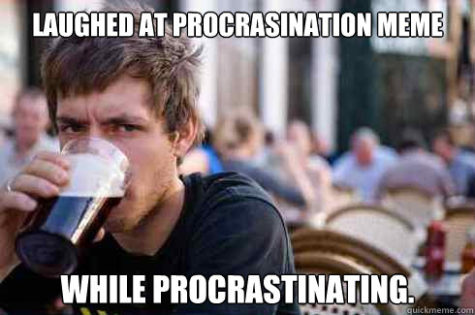
Self-deception is the handmaiden of procrastination. We don’t feel like acting now, but we don’t like the tension or dissonance it creates in us. So, we deceive ourselves—or try to (the guilt of procrastination indicates that self-deception isn’t always effective).
We tell ourselves, “I’ll feel more like it tomorrow” or make anemic intentions, or don’t remove distractions that we know undermine our work. We create little white lies as we wait for the muse to inspire us or the right mood to motivate us. But deep down we know they’re excuses. To end the self-sabotage of procrastination, it’s essential to stop the self-deception.
Overcoming Procrastination
One of the simplest and most effective solutions is to just get started—anywhere on a task. The moment you think “I’ll feel more like doing this later” or “I work better under pressure,” recognize that you’re just about to procrastinate—to give in to feel good.
Don’t think too far ahead. Just aim for a little progress. Research indicates that establishing a low threshold to task engagement fuels motivation and changes perception of the task. You’ll find it’s not as bad as you thought, and “a task begun is a task half done!”
How to transform feeble intentions into effective plans for real action? We need to move past general goal intentions to specific intentions for action: “In situation X, I will do behavior Y to achieve sub-goal Z.”
Such predecision to act increases success by shifting the cue for action to the environment. When situation X arises, we don’t have to rely on further thought and planning; it’s more about responding. Tell yourself exactly when and where you will act.
The solution to distraction lies in recognizing what distracts us and then either deciding to eliminate the menace (“Shut off Facebook while I’m at the computer”) or declaring an intention to indulge it at a specific time once some work gets done. Again, research indicates that a little strategic planning helps “pre-empt that which tempts!”
Acting in a timely manner on tasks requires active choice and the exercise of will. Recognize the enemy within and you’ll move forward doing what you intended, becoming the person you want to be.
LOL!
- Radical Self Care Project Overview by shirleytwofeathers - No Comment
- Radical Self Care Image Gallery by shirleytwofeathers - No Comment
- It’s A Wrap by shirleytwofeathers - 3 Comments
- Something To Consider by shirleytwofeathers - 1 Comment
- Nurturing Your Precious Self by shirleytwofeathers - 3 Comments
me: Make Your Own Violet Fire
Abdulrahman: Money Chant – Very Fast
Shirley Twofeathers: It’s A Wrap
Daniel Knirs: It’s A Wrap
Shirley Twofeathers: It’s A Wrap

